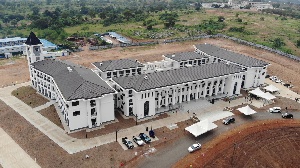Health News of Friday, 4 April 2025
Source: www.ghanawebbers.com
UHAS appeals for support to help secure Ghana’s vaccine self-sufficiency
The University of Health and Allied Sciences (UHAS) in the Volta Region seeks support. They want to expand their vaccine research and development capacity. This will help Ghana achieve vaccine self-sufficiency.
UHAS focuses on improving healthcare delivery. They need help with logistics, animal facilities, and clinical facilities for vaccine development.
Prof. Lydia Aziato, UHAS Vice-Chancellor, made this appeal during a visit. A team from the National Vaccine Institute, GIZ, UNIDO, and the EU visited UHAS. The purpose was to understand the university's vaccine development capabilities.
The team toured the multipurpose Lab Complex under construction and the Simulation Center at Phase II.
Prof. Aziato stated that UHAS has skilled researchers for vaccine development. However, they lack essential logistics for their work.
She emphasized that a partnership could provide necessary support for a full-fledged research center. "We have great potential within the health space," she said.
Prof. Aziato called on partners to collaborate with UHAS. The university has attracted experienced professors and has a peaceful research environment.
She urged urgency in her request so researchers can pass knowledge to younger generations before retiring.
Dr. Sodzi Sodzi Tetteh is the CEO of the National Vaccine Institute. He explained that their visit aimed to mobilize local resources for Ghana's vaccine production.
He noted that Ghana will reach middle-income status by 2030. This means they will no longer receive vaccines from external donors.
Currently, 80% of vaccines used in Ghana come from the Global Alliance for Vaccine Initiatives. By 2030, Ghana must fund its own vaccines.
Dr. Tetteh highlighted the importance of establishing a local vaccine institute to promote manufacturing in Ghana. He praised UHAS for setting up labs and assembling human resources for research.
He called on institutions and funding agencies to invest in UHAS’s efforts to manufacture vaccines locally.
The visiting team expressed their admiration for UHAS's progress so far. They hope more funders will support UHAS’s initiatives moving forward.
Representatives from GIZ, UNIDO, and the EU promised their support for UHAS’s vaccine development efforts.











